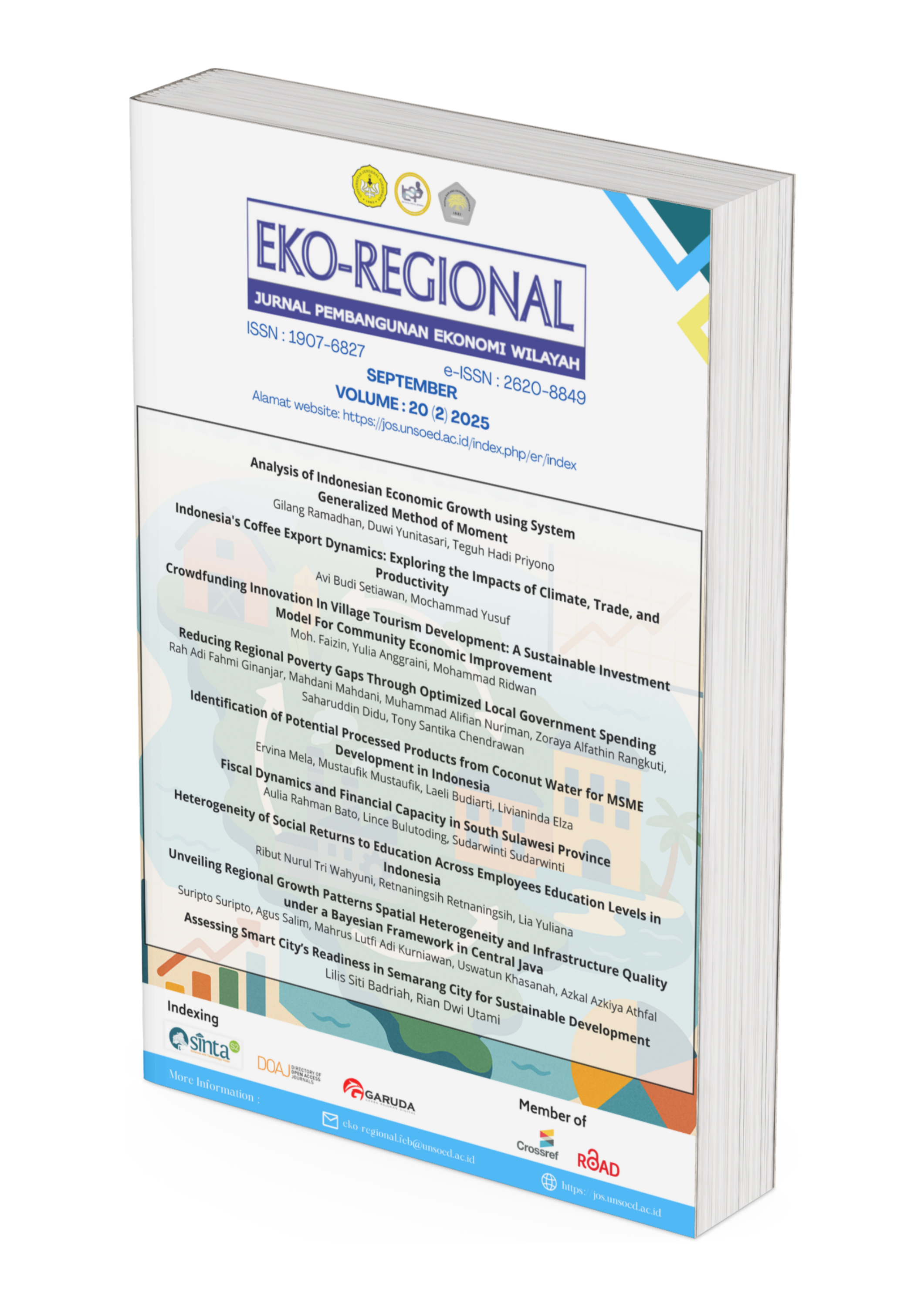Reducing Regional Poverty Gaps Through Optimized Local Government Spending
Abstract
This study aims to analyze the relationship between local government expenditure allocation and poverty reduction and map the time needed to fade the disparity between the dichotomy of regions. The methods used statistical approaches and mathematical models, both linear and non-linear, to project the time of inequality fading by observing all districts and cities in Banten Province during the period 2005-2024. The study also examines the differences in spending patterns between North and South Banten in the context of fiscal decentralization. Key results show that spending on these functions has a strong negative correlation with poverty rates, while predictive models show optimistic and pessimistic scenarios in the fading of inequality. This study concludes that optimizing local government spending can significantly accelerate the reduction of poverty gaps. The contribution of this research provides a theoretical and practical basis for more effective fiscal policies in supporting inclusive and sustainable development.
References
Amri, K., Masbar, R., Nazamuddin, B. S., & Aimon, H. (2024). DOES UNEMPLOYMENT MODERATE THE EFFECT OF GOVERNMENT EXPENDITURE ON POVERTY? A CROSS-PROVINCES DATA EVIDENCE FROM INDONESIA. Ikonomicheski Izsledvania, 2024(2), 92–113.
Ananda, C. F., Fazaalloh, A. M., Hidayati, B., & Soewardi, T. J. (2016). Economic growth and inter-regional disparity: An economic policy debate. Pertanika Journal of Social Sciences and Humanities, 24(May), 221–230.
Az Zakiyyah, N. A., Lubis, F. R. A., & Wahyuni, I. (2023). Determinants of poverty in Indonesia. Eko-Regional, 18(2).
Cano‐hila, A. B. (2022). Understanding Social Inclusion in Contemporary Society: Challenges, Reflections, Limitations, and Proposals. Social Inclusion, 10(2), 1–5. https://doi.org/10.17645/SI.V10I2.5090
Di Novi, C., Piacenza, M., Robone, S., & Turati, G. (2019). Does fiscal decentralization affect regional disparities in health? Quasi-experimental evidence from Italy. Regional Science and Urban Economics, 78. https://doi.org/10.1016/j.regsciurbeco.2019.103465
Dick-Sagoe, C. (2020). Decentralization for improving the provision of public services in developing countries: A critical review. Cogent Economics and Finance, 8(1). https://doi.org/10.1080/23322039.2020.1804036
Djiogap, C. F., Manga, J. R. A., Onana, S. P., & Bitoto, F. E. (2024). Does fiscal decentralization improve people’s access to health and education services in Cameroon? African Development Review, 36(3), 457–470. https://doi.org/10.1111/1467-8268.12770
Fofana, I., Chitiga-Mabugu, M., & Mabugu, R. E. (2023). Is Africa on Track to Ending Poverty by 2030? Journal of African Economies, 32, II87–II98. https://doi.org/10.1093/jae/ejac043
Halkos, G. E., & Aslanidis, P.-S. C. (2023). Causes and Measures of Poverty, Inequality, and Social Exclusion: A Review. Economies, 11(4). https://doi.org/10.3390/economies11040110
Jung, S., Cho, S.-H., & Roberts, R. K. (2015). The impact of government funding of poverty reduction programmes. Papers in Regional Science, 94(3), 653–675. https://doi.org/10.1111/pirs.12089
Kim, S., Lee, Y., & Kim, T. (2022). The relationship between fiscal decentralization and trust in government: evidence from the South Korean case. International Review of Administrative Sciences, 88(2), 373–389. https://doi.org/10.1177/0020852320933325
Kyriacou, A. P., & Roca-Sagalés, O. (2019). Local Decentralization and the Quality of Public Services in Europe. Social Indicators Research, 145(2), 755–776. https://doi.org/10.1007/s11205-019-02113-z
Kyriacou, A. P., & Roca-Sagalés, O. (2024). Fiscal Decentralization and Health Care Access and Quality: Evidence from Local Governments around the World. Publius: The Journal of Federalism, 54(2), 313–338. https://doi.org/10.1093/publius/pjad049
Filho, L. W., Lovren, V. O., Will, M., Salvia, A. L., & Frankenberger, F. (2021). Poverty: A central barrier to the implementation of the UN Sustainable Development Goals. Environmental Science and Policy, 125, 96–104. https://doi.org/10.1016/j.envsci.2021.08.020
Mbedzi, E., & Gondo, T. (2010). Fiscal management in Dangila Municipality, Ethiopia. Performance and policy implications. Theoretical and Empirical Researches in Urban Management, 5(5), 95–119.
Mesfin, S., & Teka, T. (2023). The practice of fiscal decentralization at local level in Ethiopia: Evidence from Oromia and Afar Regional States. Cogent Social Sciences, 9(2). https://doi.org/10.1080/23311886.2023.2241260
Miežiene, R., & Krutuliene, S. (2019). The Impact of Social Transfers on Poverty Reduction in EU Countries. Baltic Journal of European Studies, 9(1), 157–175. https://doi.org/10.1515/bjes-2019-0009
Muhammad, S., Zulham, T., Sapha, D., & Saputra, J. (2019). Investigating the public spending and economical growth on the poverty reduction in Indonesia. Industrial Engineering and Management Systems, 18(3), 495–500. https://doi.org/10.7232/iems.2019.18.3.495
Nae, T. M., Florescu, M.-S., & Bălășoiu, G.-I. (2024). Towards Social Justice: Investigating the Role of Labor, Globalization, and Governance in Reducing Socio-Economic Inequality within Post-Communist Countries. Sustainability (Switzerland) , 16(6). https://doi.org/10.3390/su16062234
Oates, W. E. (1972). Fiscal federalism. In New York (Vol. 1). Harcourt Brace Jovanovich.
Qian, T., & Zhang, Q. (2017). Fiscal decentralization and pattern of county public expenditures in a Chinese province. Annals of Economics and Finance, 18(1), 201–226.
Sinuany-Stern, Z. (2014). Quadratic model for allocating operational budget in public and nonprofit organizations. Annals of Operations Research, 221(1), 357–376. https://doi.org/10.1007/s10479-013-1392-6
Sun, S., & Andrews, R. (2023). Intra-provincial fiscal decentralization, relative wealth, and healthcare efficiency: Empirical evidence from China. Public Administration, 101(3), 973–992. https://doi.org/10.1111/padm.12832
Tamba, H. L. A., Shen, M., Nugraheni, S., Sigiro, E. E., & Nafisa, F. (2024). The Realization of Village, Education, and Health Funds to Reduce Poverty in Eastern Indonesia. Eko-Regional, 19(2), 128–141.
Thanh, S. D., & Canh, N. P. (2019). Local Governance: Impacts of Fiscal Decentralization on Government Size and Spending Composition in Vietnam*. Asian Economic Journal, 33(4), 311–340. https://doi.org/10.1111/asej.12189
Fonayet, F. V, Belzunegui Eraso, Á., & De Andrés Sánchez, J. (2020). Efficiency of Social Expenditure Levels in Reducing Poverty Risk in the EU-28. Poverty and Public Policy, 12(1), 43–62. https://doi.org/10.1002/pop4.267
Wang, C., Chen, X., Hu, J., & Shahid, M. (2023). Poverty alleviation and rural revitalization: Perspective of fiscal spending and data evidence from 81 Chinese counties. Heliyon, 9(7). https://doi.org/10.1016/j.heliyon.2023.e17451
Wang, L., Zhou, J., Chen, K., Yan, L., & Tu, Y. (2022). The impact of China’s inclusive finance on multidimensional poverty in rural areas. Progress in Geography, 41(11), 1991–2003. https://doi.org/10.18306/dlkxjz.2022.11.001
Wei, Y., Zhong, F., Song, X., & Huang, C. (2023). Exploring the impact of poverty on the sustainable development goals: Inhibiting synergies and magnifying trade-offs. Sustainable Cities and Society, 89. https://doi.org/10.1016/j.scs.2022.104367
Zheng, H., Lyu, G., Ke, J., & Teo, C.-P. (2022). From Targeting to Transfer: Design of Allocation Rules in Cash Transfer Programs. Manufacturing and Service Operations Management, 24(6), 2901–2924. https://doi.org/10.1287/msom.2022.1101








.png)




